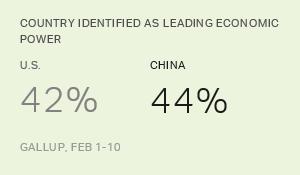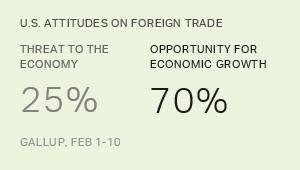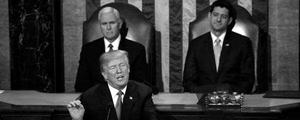Story Highlights
- 62% say China's trade policy toward the U.S. is unfair
- Majorities say Canada's, the EU's and Japan's trade policies are fair
- Views of Mexico's trade policies are mixed: 44% fair, 46% unfair
WASHINGTON, D.C. -- As the Trump administration's tariffs on Chinese goods have gone into effect, a majority of Americans -- 62% -- believe China's trade policies with the U.S. are unfair, suggesting the public supports the concept of attempting to change China's policies. Americans, however, tilt toward the belief that two other recent targets of presidential anger over trade -- Canada and the EU -- have fair trade practices with the U.S. A majority of Americans also believe Japan's trade practices are fair, while the public is divided on the trade policies of Mexico.
| Fair | Unfair | Don't know/ No opinion |
|||||||||||||||||||||||||||||||||||||||||||||||||||||||||||||||||||||||||||||||||||||||||||||||||
|---|---|---|---|---|---|---|---|---|---|---|---|---|---|---|---|---|---|---|---|---|---|---|---|---|---|---|---|---|---|---|---|---|---|---|---|---|---|---|---|---|---|---|---|---|---|---|---|---|---|---|---|---|---|---|---|---|---|---|---|---|---|---|---|---|---|---|---|---|---|---|---|---|---|---|---|---|---|---|---|---|---|---|---|---|---|---|---|---|---|---|---|---|---|---|---|---|---|---|---|
| % | % | % | |||||||||||||||||||||||||||||||||||||||||||||||||||||||||||||||||||||||||||||||||||||||||||||||||
| Canada | 65 | 24 | 10 | ||||||||||||||||||||||||||||||||||||||||||||||||||||||||||||||||||||||||||||||||||||||||||||||||
| European Union | 56 | 29 | 15 | ||||||||||||||||||||||||||||||||||||||||||||||||||||||||||||||||||||||||||||||||||||||||||||||||
| Japan | 55 | 33 | 12 | ||||||||||||||||||||||||||||||||||||||||||||||||||||||||||||||||||||||||||||||||||||||||||||||||
| Mexico | 44 | 46 | 11 | ||||||||||||||||||||||||||||||||||||||||||||||||||||||||||||||||||||||||||||||||||||||||||||||||
| China | 30 | 62 | 9 | ||||||||||||||||||||||||||||||||||||||||||||||||||||||||||||||||||||||||||||||||||||||||||||||||
| GALLUP, June 18-24, 2018 | |||||||||||||||||||||||||||||||||||||||||||||||||||||||||||||||||||||||||||||||||||||||||||||||||||
President Donald Trump's recent tariffs on goods imported from China have caused that country to impose retaliatory tariffs on U.S. goods. Trump has also imposed new tariffs on steel and aluminum imported to the U.S. from other countries, including Canada, and has made threats to increase tariffs on European cars coming into the U.S. At the same time, he is attempting to revisit or eliminate the North American Free Trade Agreement, which has provided essentially free trade with Canada and Mexico for most products and services.
The results of Gallup's June 18-24 survey show that Americans' views on the trade practices of the countries involved in these actions are not monolithically negative; rather, they vary widely depending on the country involved. Only on China do a majority of Americans -- 62% -- agree that its trade practices toward the U.S. are unfair. By contrast, almost two-thirds of Americans say Canada practices fair trade, while 56% say this about the EU and 55% about Japan. Forty-four percent say Mexico has fair trade practices, while 46% say they are unfair.
Biggest Change Since 1993 in Attitudes Toward Japan's Trade Practices
Gallup initially asked this trade policy question about Canada, Mexico, "the European Common Market countries" and Japan in June 1993. This was just before President Bill Clinton attended a trade policy summit in Tokyo and during the contentious debate over NAFTA, which was eventually passed by the Senate in November and signed into law in December 1993.
Clinton had focused specifically on Japan's trade policies in his early months in office, labeled them as unfair, and pushed through the July 1993 Trade Framework with Japan. Americans apparently shared his concerns about Japan at that time. In the June 1993 Gallup survey, 24% of Americans said Japan's trade policies were fair, making it by far the least positively evaluated of the four countries or groups of countries measured. But given little recent discussion of unfair Japanese trade practices, Americans' views of Japan's trade policies have become much more positive over the past 25 years, with 55% now saying they are fair.
% Fair
| 1993 | 2018 | ||||||||||||||||||||||||||||||||||||||||||||||||||||||||||||||||||||||||||||||||||||||||||||||||||
|---|---|---|---|---|---|---|---|---|---|---|---|---|---|---|---|---|---|---|---|---|---|---|---|---|---|---|---|---|---|---|---|---|---|---|---|---|---|---|---|---|---|---|---|---|---|---|---|---|---|---|---|---|---|---|---|---|---|---|---|---|---|---|---|---|---|---|---|---|---|---|---|---|---|---|---|---|---|---|---|---|---|---|---|---|---|---|---|---|---|---|---|---|---|---|---|---|---|---|---|
| % | % | ||||||||||||||||||||||||||||||||||||||||||||||||||||||||||||||||||||||||||||||||||||||||||||||||||
| Canada | 77 | 65 | |||||||||||||||||||||||||||||||||||||||||||||||||||||||||||||||||||||||||||||||||||||||||||||||||
| European Union* | 52 | 56 | |||||||||||||||||||||||||||||||||||||||||||||||||||||||||||||||||||||||||||||||||||||||||||||||||
| Mexico | 45 | 44 | |||||||||||||||||||||||||||||||||||||||||||||||||||||||||||||||||||||||||||||||||||||||||||||||||
| Japan | 24 | 55 | |||||||||||||||||||||||||||||||||||||||||||||||||||||||||||||||||||||||||||||||||||||||||||||||||
| * 1993 wording: European Common Market | |||||||||||||||||||||||||||||||||||||||||||||||||||||||||||||||||||||||||||||||||||||||||||||||||||
| GALLUP | |||||||||||||||||||||||||||||||||||||||||||||||||||||||||||||||||||||||||||||||||||||||||||||||||||
Americans' views of the trade practices of Mexico and the European Union have stayed about the same since 1993, while attitudes toward Canada's trade policies, although still strongly positive on balance, are less so than they were 25 years ago, with 65% saying they are fair now, compared with 77% in 1993.
Republicans and Democrats Have Become Increasingly Polarized in Their Views
Republicans' and Democrats' views on the trade practices of these countries have shifted in opposite directions since 1993, reflecting both the significant increase in political polarization that has affected views of many policy issues in recent years and the strongly negative way in which Trump has framed these countries' trade policies.
Republicans have become significantly more likely to say the trade policies of Canada, the EU, and Mexico are unfair, while Democrats have become at least slightly more likely to view the trade policies of these three countries as fair. Independents have generally kept about the same attitudes.
All three groups have become more positive about Japan, but Republicans significantly less so than independents or Democrats.
| 1993 | 2018 | |||||||||||||||||||||||||||||||||||||||||||||||||||||||||||||||||||||||||||||||||||||||||||||||||||
|---|---|---|---|---|---|---|---|---|---|---|---|---|---|---|---|---|---|---|---|---|---|---|---|---|---|---|---|---|---|---|---|---|---|---|---|---|---|---|---|---|---|---|---|---|---|---|---|---|---|---|---|---|---|---|---|---|---|---|---|---|---|---|---|---|---|---|---|---|---|---|---|---|---|---|---|---|---|---|---|---|---|---|---|---|---|---|---|---|---|---|---|---|---|---|---|---|---|---|---|---|
| Fair | Unfair | Fair | Unfair | |||||||||||||||||||||||||||||||||||||||||||||||||||||||||||||||||||||||||||||||||||||||||||||||||
| % | % | % | % | |||||||||||||||||||||||||||||||||||||||||||||||||||||||||||||||||||||||||||||||||||||||||||||||||
| Canada | ||||||||||||||||||||||||||||||||||||||||||||||||||||||||||||||||||||||||||||||||||||||||||||||||||||
| Republicans | 81 | 7 | 49 | 41 | ||||||||||||||||||||||||||||||||||||||||||||||||||||||||||||||||||||||||||||||||||||||||||||||||
| Independents | 74 | 13 | 66 | 21 | ||||||||||||||||||||||||||||||||||||||||||||||||||||||||||||||||||||||||||||||||||||||||||||||||
| Democrats | 76 | 7 | 82 | 14 | ||||||||||||||||||||||||||||||||||||||||||||||||||||||||||||||||||||||||||||||||||||||||||||||||
| European Union* | ||||||||||||||||||||||||||||||||||||||||||||||||||||||||||||||||||||||||||||||||||||||||||||||||||||
| Republicans | 54 | 28 | 42 | 45 | ||||||||||||||||||||||||||||||||||||||||||||||||||||||||||||||||||||||||||||||||||||||||||||||||
| Independents | 52 | 33 | 55 | 27 | ||||||||||||||||||||||||||||||||||||||||||||||||||||||||||||||||||||||||||||||||||||||||||||||||
| Democrats | 51 | 33 | 70 | 20 | ||||||||||||||||||||||||||||||||||||||||||||||||||||||||||||||||||||||||||||||||||||||||||||||||
| Mexico | ||||||||||||||||||||||||||||||||||||||||||||||||||||||||||||||||||||||||||||||||||||||||||||||||||||
| Republicans | 47 | 39 | 29 | 62 | ||||||||||||||||||||||||||||||||||||||||||||||||||||||||||||||||||||||||||||||||||||||||||||||||
| Independents | 47 | 39 | 46 | 43 | ||||||||||||||||||||||||||||||||||||||||||||||||||||||||||||||||||||||||||||||||||||||||||||||||
| Democrats | 42 | 43 | 59 | 35 | ||||||||||||||||||||||||||||||||||||||||||||||||||||||||||||||||||||||||||||||||||||||||||||||||
| Japan | ||||||||||||||||||||||||||||||||||||||||||||||||||||||||||||||||||||||||||||||||||||||||||||||||||||
| Republicans | 21 | 71 | 46 | 41 | ||||||||||||||||||||||||||||||||||||||||||||||||||||||||||||||||||||||||||||||||||||||||||||||||
| Independents | 24 | 69 | 55 | 32 | ||||||||||||||||||||||||||||||||||||||||||||||||||||||||||||||||||||||||||||||||||||||||||||||||
| Democrats | 27 | 65 | 65 | 27 | ||||||||||||||||||||||||||||||||||||||||||||||||||||||||||||||||||||||||||||||||||||||||||||||||
| China | ||||||||||||||||||||||||||||||||||||||||||||||||||||||||||||||||||||||||||||||||||||||||||||||||||||
| Republicans | -- | -- | 21 | 71 | ||||||||||||||||||||||||||||||||||||||||||||||||||||||||||||||||||||||||||||||||||||||||||||||||
| Independents | -- | -- | 31 | 59 | ||||||||||||||||||||||||||||||||||||||||||||||||||||||||||||||||||||||||||||||||||||||||||||||||
| Democrats | -- | -- | 38 | 57 | ||||||||||||||||||||||||||||||||||||||||||||||||||||||||||||||||||||||||||||||||||||||||||||||||
| * 1993 wording: European Common Market | ||||||||||||||||||||||||||||||||||||||||||||||||||||||||||||||||||||||||||||||||||||||||||||||||||||
| GALLUP | ||||||||||||||||||||||||||||||||||||||||||||||||||||||||||||||||||||||||||||||||||||||||||||||||||||
The net result of these changes are today's huge partisan gaps in views of the trade practices of these countries -- gaps that were not in evidence in 1993.
The biggest partisan gap occurs in views of Canada, whose practices are deemed fair by 49% of Republicans and 82% of Democrats. The big drop in Republicans' positive views of Canada's trade policies from 1993 comes in the wake of Trump's recent criticisms of Canada's tariffs and his personal attacks on Canadian Prime Minister Justin Trudeau (calling him "dishonest and weak" on trade). Democrats' positive views of Canada's trade practices have edged upward since 1993.
The current Republican-Democratic gaps in views of the trade practices of Mexico and the European countries are almost as large as is the case for Canada, again reflecting increased Republican negativity and Democratic positivity. The gap in views of Japan is somewhat smaller, but still significant.
Gallup did not ask about China in the 1993 survey. The majority of all three political groups today believe that China's trade practices are unfair, although Republicans are substantially more likely to hold that view than independents or Democrats.
Americans Less Certain About Trade Impact on Their Personal Situation
Two additional questions included in the June 18-24 survey asked Americans about the impact of U.S. trade policies and tariffs on their personal finances and on their place of employment, in contrast to the previous questions asking about their views of other countries' trade practices. These questions offered respondents the explicit option to indicate they didn't know enough to have an opinion, and the majority of Americans chose that option in both cases.
The views of those who do have opinions are divided, with about equal percentages saying U.S. trade practices and tariffs are helpful and harmful to their personal financial situations, while workers with opinions tilt positive in assessing the impact of these policies on their company's finances. Overall, 20% of the general public says U.S. trade policies affect them adversely (while 22% say they help), and 15% of workers say U.S. policies affect their employer adversely (while 25% say they are helpful to their employer).
| Helpful | Harmful | Don't know/ No answer |
|||||||||||||||||||||||||||||||||||||||||||||||||||||||||||||||||||||||||||||||||||||||||||||||||
|---|---|---|---|---|---|---|---|---|---|---|---|---|---|---|---|---|---|---|---|---|---|---|---|---|---|---|---|---|---|---|---|---|---|---|---|---|---|---|---|---|---|---|---|---|---|---|---|---|---|---|---|---|---|---|---|---|---|---|---|---|---|---|---|---|---|---|---|---|---|---|---|---|---|---|---|---|---|---|---|---|---|---|---|---|---|---|---|---|---|---|---|---|---|---|---|---|---|---|---|
| % | % | ||||||||||||||||||||||||||||||||||||||||||||||||||||||||||||||||||||||||||||||||||||||||||||||||||
| In general, do you think U.S. trade practices and tariffs with other countries have mostly been helpful or harmful to your family's financial situation, or don't you know enough to say? | 22 | 20 | 59 | ||||||||||||||||||||||||||||||||||||||||||||||||||||||||||||||||||||||||||||||||||||||||||||||||
| (Asked of employed adults only) In general, do you think U.S. trade practices and tariffs with other countries have mostly been helpful or harmful to your employer's financial situation, or don't you know enough to say? | 25 | 15 | 60 | ||||||||||||||||||||||||||||||||||||||||||||||||||||||||||||||||||||||||||||||||||||||||||||||||
| GALLUP, June 18-24, 2018 | |||||||||||||||||||||||||||||||||||||||||||||||||||||||||||||||||||||||||||||||||||||||||||||||||||
Bottom Line
President Trump's basic position on trade is that U.S. trade policies have historically been ill-informed and need significant and drastic revisions -- in large part, he says, because the policies of many foreign nations are unfair toward the United States.
Americans do tend to agree with Trump's position that China's trade policies toward the U.S. are unfair, and they are split in their views of Mexico's trade policies. But Americans do not share Trump's conclusion that Canada's and EU countries' policies are unfair to the U.S. -- in part because these countries are generally held in high regard (Canada is Americans' most favorably evaluated country).
More broadly, although Trump has placed a great deal of emphasis on unfair trade and what the U.S. needs to do to fix the situation, there is little evidence that Americans on average consider this a highly urgent issue. Almost no Americans mention trade as the nation's top problem. Over the past five years, Americans have been significantly more likely to view foreign trade as a plus for the U.S. economy and jobs, rather than as a negative. And, on a personal level, the significant majority of Americans say they don't know enough about U.S. trade practices and tariffs with other countries to have an opinion on how they affect them personally or their employer. And among those with an opinion, positive views are at least as prevalent as negative ones.
Most Americans are not trade experts, of course, and perceptions of the trade policies of other countries reflect what they read, see and hear in the news and social media, and from other indirect sources of information. Still, Americans' attitudes remain important to understand -- even if they shift with new developments -- because perceptions can be translated into reality when it comes to voting and support for policy positions that political leaders espouse.
Survey Methods
Results for this Gallup poll are based on telephone interviews conducted June 18-24, 2018, on the Gallup U.S. Poll, with a random sample of 1,505 adults, aged 18 and older, living in all 50 U.S. states and the District of Columbia. For results based on the total sample of national adults, the margin of sampling error is ±3 percentage points at the 95% confidence level. For results based on the total sample of 912 employed adults, the margin of sampling error is ±4 percentage points at the 95% confidence level. For results based on the samples of 451 Republicans and 433 Democrats, the margin of error is ±6 percentage points, and for the sample of 560 independents, the margin of error is ±5 percentage points, all at the 95% confidence level. All reported margins of sampling error include computed design effects for weighting.
Each sample of national adults includes a minimum quota of 70% cellphone respondents and 30% landline respondents, with additional minimum quotas by time zone within region. Landline and cellular telephone numbers are selected using random-digit-dial methods.
View survey methodology, complete question responses and trends.
Learn more about how the Gallup U.S. Poll works.




